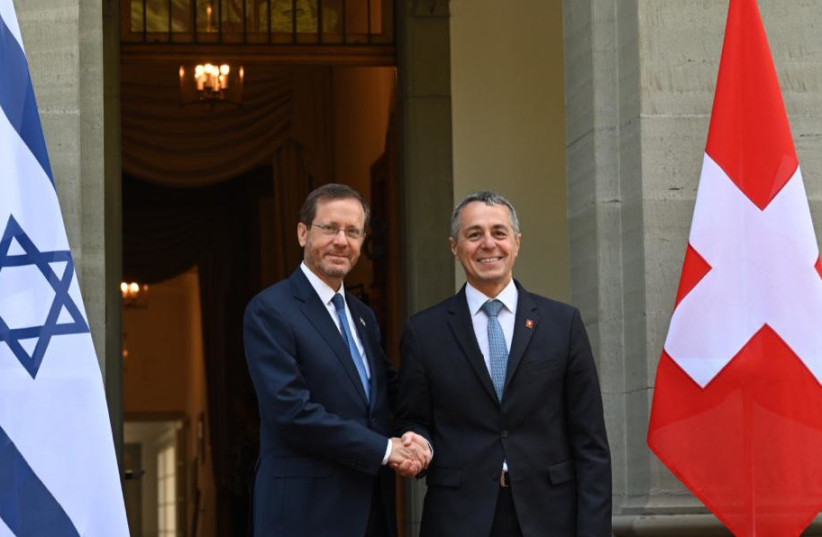President Isaac Herzog met with Swiss Confederation President Ignazio Cassis during his official visit to Basel on Monday.
Herzog called upon the Swiss and all other governments “to oppose the Iranian nuclear program in no uncertain terms. Iran has sworn itself to Israel’s destruction and is working tirelessly to destabilize our region and the entire world.”
Israel expects the international community and the nations “that so proudly push for international peace [to] not accept calls and efforts to eradicate a sovereign member state of the United Nations,” he said. “Iran’s behavior cannot be met with silence. Iran’s activities cannot go unpunished. And most critically, such a state must not be allowed to possess nuclear capabilities. Iran must be denied such capabilities by all means necessary.
“Switzerland, as a member of the United Nations and as an incoming member of the Security Council, a candidacy which Israel was happy to endorse, and as a member of the IAEA Board of Governors, is strategically positioned,” the president pointed out.
“The IAEA’s independence is critical. It should be strictly adhered to, including its ability to investigate violations of nuclear developments in Iran.

“The State of Israel shares with Switzerland this commitment to peace and fervently aspires to peace with all its neighbors and of course with our Palestinian neighbors, our immediate neighbors.”
President Isaac Herzog
“Israel cannot accept a situation in which a member state of the United Nations calls for its annihilation. It’s the only case in the world in which one country calls for the annihilation of another, and life goes on as if nothing happened in the worlds of morality and diplomacy, in parallel to negotiations with Iran for a deal that I have already heavily criticized in the past.”
President Raisi's comments
During a press conference on Monday, Iranian President Ebrahim Raisi said if Israel decides to move against the Islamic Republic, it will not have enough time to act before nothing is left of the country. He added that there will be no way back to a nuclear deal if the IAEA probe continues.
Herzog responded, “The Iranian president’s statement today is perfectly clear. It says, ‘We don’t respect the independence of the International Atomic Energy Agency to investigate open cases,’ which are major cases involving enriched uranium, located by IAEA inspectors.
“I call on the international community, including from here in Switzerland – a loyal member of the international order, international law and the international community – to do everything to ensure the IAEA’s independence and of course to deny Iran nuclear weapons,” he said.
“The State of Israel shares with Switzerland this commitment to peace and fervently aspires to peace with all its neighbors and of course with our Palestinian neighbors, our immediate neighbors. Unfortunately, the recent conflict with terrorists in Gaza, in which over one thousand missiles were fired at our towns, was imposed on us. We were forced to fight terrorist threats and to defend our people.”
Herzog thanked the countries that “played a role in the effort to secure calm,” specifically Egypt and Qatar, “which demonstrated the requisite leadership for regional stability.”
During his speech, Herzog thanked Switzerland for its role in hosting the First Zionist Congress.
“I commend your country’s pivotal role in the Jewish people’s historic journey home and I thank you for so graciously facilitating the commemoration of the first time,” he said.
Cassis explained that the diplomatic meeting and the Zionist Congress were not “an isolated event,” but rather “part of a series of high-level contacts between Israel and Switzerland these past two years.”
The Swiss president said the Federal Council has set three priorities for Switzerland’s relations with Israel. The first priority is the “expansion of economic context.” Second, Cassis mentioned cooperation in the field of innovation. The third priority is the “support of dialogue and peace in the Middle East.” Cassis revealed that this conflict was “the main discussion during the political dialogue” with Herzog.
Regarding scientific research, Cassis said, “Switzerland supports a research center that works across political borders to protect coral reefs in the Red Sea. Its partners include Israel, Jordan, Saudi Arabia and Egypt.”
He praised the Israeli government, saying, “We have witnessed positive developments the past year,” while addressing “the resumption of high level contacts between Israelis and Palestinians.” Cassis added, “Unfortunately, there have also been worrying developments, including tensions in Jerusalem and the recent escalation of violence against Gaza.
“Switzerland is convinced that the conflict can only be entered through a process based on the two states [solution] and international law,” he said. “It is time for Israelis and Palestinians to return to the negotiation table.”
Cassis offered Switzerland as a mediator for peace negotiations. “We’re ready to use our good offices to help advance the search for peace,” he said.
He added that he discussed the fight against antisemitism with his Israeli counterpart.
“Regrettably, antisemitism is still a reality in Europe and worldwide. All of us have a great responsibility to fight antisemitism and to never forget.”
Asked about trade between Switzerland and Iran, Cassis said, “Israel is one of our most important trade partners [in the region], not Iran. We are very much disappointed by the impossibility at this moment to go ahead with the JCPOA,” referencing the nuclear deal with its official acronym.
He concluded by saying, “We have to find new ways [to negotiate with Iran] since the ways we have had until now are not working anymore.”
